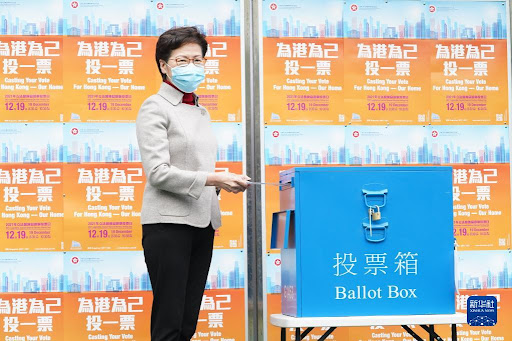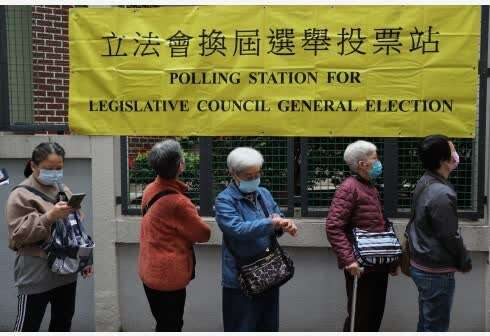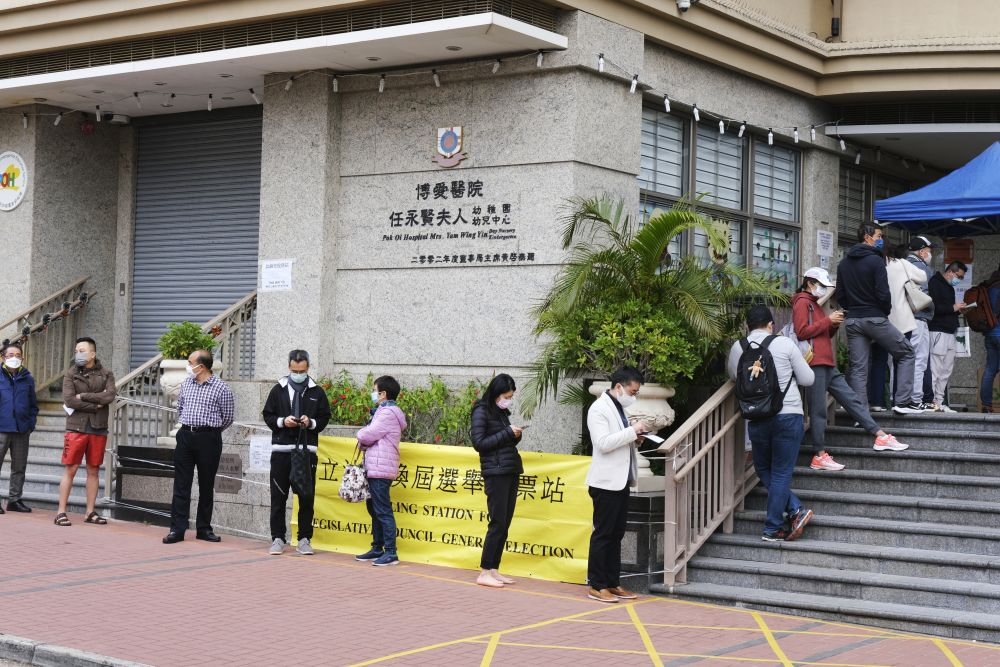Widgetized Section
Go to Admin » Appearance » Widgets » and move Gabfire Widget: Social into that MastheadOverlay zone
Hong Kong legislative Council election: first election under “patriots governing Hong Kong”

Hong Kong today held its first legislative Council election on December 19 since the introduction of the National Security Law and major changes to the electoral mechanism.
Compared with the previous election in 2016, the total number of seats in the legislative Council increased from 70 to 90, but the number of seats directly elected by geographical constituencies fell from 35 to 20. There were 4.47 million eligible voters for directly elected seats, and 630 general polling stations were set up in Hong Kong.
In addition, the number of functional constituencies was reduced to 30, and the number of individual constituencies such as the legal sector and the information technology sector was changed from individual to corporate constituencies. There are nearly 220,000 eligible voters in this section.
The remaining 40 seats will be chosen internally by the 1,488-member Election Committee, which originally nominated and voted for the chief executive. Under the new system, the committee has expanded its powers to select the 40 legislative council seats as well as nominate them.

Compared with the previous legislative elections, the election was less contentious. Pan-democratic and indigenous candidates were absent, many were jailed for national security laws or protest-related cases, and some former district councilors candidates were disqualified during the government-required oath of allegiance. There are others who have failed to balance their interests.
Out of 153 eligible candidates vying for 90 seats, only 13 are non-establishment, including some former pan-Democrats.
“As the first election for the legislative Council under the revised electoral system is held today, many people seem to care more about turnout than who wins.” The Ming Pao, a local newspaper in Hong Kong, said in an editorial that the absence of the traditional pan-Democratic parties and the lack of non-establishment candidates in the election made it hard for the pan-Democratic Establishment to mobilize and fight to the death in the past. The new political situation affected the voting intentions of supporters from different camps, and the low turnout was expected.

Tan Huizhu, deputy director of the Commission for the Basic Law of Hong Kong of the Standing Committee of the National People’s Congress, said before the election that the atmosphere of this legislative Council election was cooler than in the past because of the outbreak of COVID-19, the number of directly elected seats and the number of candidates. She thought a turnout of 30 percent would be good. However, previous elections were driven by political ideology, and the election atmosphere was too hot, causing trauma and confrontation to the society. She believes that if the new legislature does well, turnout will pick up in four years.
Hong Kong’s chief executive Carrie Lam has also practiced “expectation management” many times. On voter turnout, Carrie Lam said the government had not set a target but would not worry about it because it was affected by various factors, such as politics, society, economy and governance at the time. He urged the public not to read too much into it.
Opponents see turnout as a new battleground in the political battle, arguing that the smaller the turnout, the more embarrassing the regime and the less legitimacy the election will be.
The Independent Commission against Corruption (ICAC) announced on 29 November that former Democratic Party legislator Hui Chi-fung and former district councillor Yau Man-chun were wanted for allegedly inciting others to vote in or out of the ballot. Hui responded on Facebook by saying that casting a blank, spoiled or non-voting ballot is a legal right of citizens, and that the ban reflects “the cowardice of tyranny against the people.”
In addition, the government took some new measures in this election. For example, three polling stations were set up at the border between Hong Kong and Shenzhen for the first time so that Hong Kong voters in the mainland could immediately return to the mainland after passing the ballot to avoid quarantine. A total of 22,000 voters registered. And for the first time, Hong Kong introduced a free transport scheme on election day. However, authorities denied the measures were aimed at boosting turnout.
As of press time, voting has not closed, but according to the statistics available, this year’s turnout is lower than last year’s district council election, significantly lower than two years ago.
By 4:30 p.m., eight hours after voting began, 940,000 people had cast ballots, a turnout of 21.02 percent, according to official figures. In the 2016 Legislative election, turnout was 26.93% within eight hours. In the 2019 district Council elections, turnout was 47.26% within eight hours.
However, turnout was higher in the 1,488 first-time election committee sectors, where turnout had reached 93.44 per cent by 4:30. During the same period, voter turnout in functional constituencies was only 21.63 percent, with education, health, social welfare and accounting, which have the largest number of voters, temporarily ranked among the lowest.
After casting her vote at a polling station in Central with her husband this morning, Carrie Lam told the media that the election was “fair, open, fair, clean and humanely arranged” and appealed to registered voters to cast their ballots.
She recalled that when she participated in the district Council election two years ago, she went to the same polling station to vote, “But what was the situation at that time? It was a ‘black violence’ disorder. Everyone stepped into the polling station, and they had to worry about their personal safety. This is not an election that Hong Kong wants, this is not a democratic election; But today the order is good and we are all comfortable to cast our vote.”
Chan Po-ying, chairwoman of the Hong Kong political party Social Democratic Line, and others attended the demonstration. According to Hong Kong media reports, Ms. Chan chided Mrs. Lam for destroying the electoral system by postponing elections scheduled for last year for more than a year, during which time the system had changed beyond recognition.
She believes that Hong Kong people have been deprived of their right to vote. Although they have the right to vote, they actually have no real choice under constant screening and screening.
She also criticized the election as a drama, but any election is an opportunity for the public to express their opinions. She called on the public to “vote with their conscience” to express their views on the governance and future development of the government.
China’s official media in People’s Daily commentary, will be referred to as a “safety valve” the new electoral system, plug the disorderly molecules into the power authority, destruction in an opportunity of constitutional order, the article also described the electoral reform is only the first step, the key is to choose good governance team, in the solution actual problem of Hong Kong, And participation in the election is the “second half article” that must be done well after restructuring.
This paper described the candidate in a variety of channels to listen their opinions, “Hong Kong election increasingly thick atmosphere, refreshing”, must strictly implement the principles for administering Hong Kong “patriot”, “small to classroom there will be no ‘yellow division, housing is no longer limited to 㓥 room cage homes, say goodbye to break through the bottleneck of economic development, social torn internal friction”.

